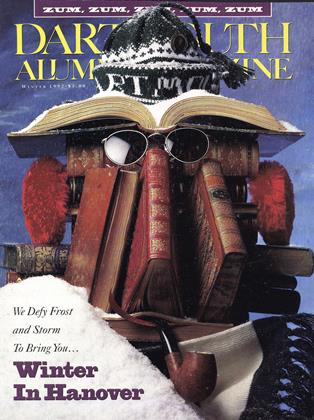"The hour or two spent with students in class is usually too precious to waste on lectures."
IF YOU NEVER took one of Religion Professor Ronald Green's courses, you haven't missed your chance. Green, recipient of Dartmouth's Distinguished Teaching Award in 1980, is a regular on the consulting circuit at such firms as Ogilvy & Mather, North American Philips, and Bristol-Myers Squibb. "Issues and cases I pick up on these occasions often come right back into my teaching and writing," says the wandering prof.
In addition to his courses on theoretical and applied ethics—including medical ethics—Green has been teaching business ethics since first teaming up with the Tuck School's John Hennessey in the mid-1980s. "I regard my years teaching with John as my second Ph.D.," says Green. "I learned from him the demanding art of case teaching. John taught me that a class's moments of silence during a discussion are not necessarily a sign of boredom or lack of preparation.
They can be times when members of the class are thinking and gathering energies for a new wave of tearing into the case. The hour or two spent with students in class is usually too precious to waste on lectures that I could easily photocopy and hand out. Students must teach and learn from one another. I'm the catalyst."
The Harvard trained Green originally wandered into the academic field of religion to see what was in the ancient traditions—"to look at them as real treasures, not just the ancient past." He is now writing a textbook on business ethics {The EthicalManager, Macmillan) with one of his former students,
Wharton professor Robbin Derry '75. But Green is also keeping up with more traditional philosophical areas. "When I become overwhelmed by the complexity of real-world decision-making, it's nice to retreat into the moral and religious certainties of the eighteenth and nineteenth centuries," he says. His latest retreat produced Kierkegaard and Kant: The HiddenDebt (SUNY Press, 1992). It may sound like just another academic tome, but, hey, this is Ron Green. The book reads like a philosophical mystery. Unravelling the philosophers' cryptic clues, Green spins out the intrigue of their lives and ideas.
 View Full Issue
View Full Issue
More From This Issue
-
 Feature
FeatureKnow Your Place
December 1992 By George J.Demko -
 Feature
FeatureCure1 For The Common Cold2 Proven3 At Dartmouth4!
December 1992 By TIG TILLINGHAST '93 -
 Cover Story
Cover StoryThe Library Culture
December 1992 -
 Cover Story
Cover StoryThe Ether Library
December 1992 -
 Cover Story
Cover StoryRethinking The Stacks
December 1992 By Tig Tillinghast '93 -
 Cover Story
Cover StoryWith Hard-bound Books, Who Needs Digital?
December 1992
Karen Endicott
-
 Article
ArticleDARTMOUTH AUTHORS
SEPTEMBER 1988 By Karen Endicott -
 Article
ArticleThe Daughters of Eve
October 1993 By Karen Endicott -
 Article
ArticleThe City Peter Built
Winter 1993 By Karen Endicott -
 Article
ArticleSlesnick by the Numbers
SEPTEMBER 1994 By Karen Endicott -
 Classroom
ClassroomIs There a Robot In the House?
Nov/Dec 2001 By KAREN ENDICOTT -
 CLASSROOM
CLASSROOMFrom the Page to the Stage
Mar/Apr 2002 By Karen Endicott
Article
-
 Article
ArticleS. S. "Dartmouth"
February 1943 -
 Article
ArticleYou Gotta Rusk to Beat this Record
March 1998 -
 Article
ArticleAthletics
Mar/Apr 2002 -
 Article
ArticleFish and Game in the Outing Club
April 1937 By HENRY M. DOREMUS 37 -
 Article
ArticleSAMUEL WALKER McCALL '74
July 1918 By Judge Nelson Pierce Brown '99 -
 Article
ArticleTHE UNDERGRADUATE CHAIR
December 1960 By TOM DALGLISH '61

